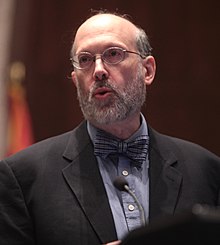
Douglas Howard Ginsburg is an American lawyer and jurist serving as a senior U.S. circuit judge of the U.S. Court of Appeals for the District of Columbia Circuit. He is also a professor of law at the Antonin Scalia Law School of George Mason University.
Peter H. Irons is an American political activist, civil rights attorney, legal scholar, and professor emeritus of political science. He has written many books on the U.S. Supreme Court and constitutional litigation.

Cass Robert Sunstein is an American legal scholar known for his work in constitutional law, administrative law, environmental law, and behavioral economics. He is also The New York Times best-selling author of The World According to Star Wars (2016) and Nudge (2008). He was the administrator of the White House Office of Information and Regulatory Affairs in the Obama administration from 2009 to 2012.
Leonard Williams Levy was an American historian, the Andrew W. Mellon All-Claremont Professor of Humanities and chairman of the Graduate Faculty of History at Claremont Graduate School, California, who specialized in the history of basic American Constitutional freedoms.
Aviam Soifer is an American legal scholar who worked on high-profile matters for the American Civil Liberties Union and later served as dean of two American law schools, at the Boston College Law School from 1993 to 1998, and at the William S. Richardson School of Law at University of Hawaiʻi at Mānoa from 2003 to 2020. He is an elected member of the American Law Institute.
Michael William McConnell is an American jurist who served as a United States circuit judge of the United States Court of Appeals for the Tenth Circuit from 2002 to 2009. Since 2009, McConnell has been a professor and Director of the Stanford Constitutional Law Center at Stanford Law School. He is also a senior fellow at Stanford University's Hoover Institution, and Senior Of Counsel to the Litigation Practice Group at Wilson Sonsini Goodrich & Rosati. In May 2020, Facebook appointed him to its content oversight board. In 2020, McConnell published The President Who Would Not Be King: Executive Power under the Constitution under Princeton University Press.
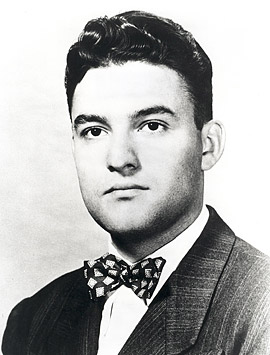
Jack Greenberg was an American attorney and legal scholar. He was the Director-Counsel of the NAACP Legal Defense Fund from 1961 to 1984, succeeding Thurgood Marshall. He was involved in numerous crucial cases, including Brown v. Board of Education, which ended segregation in public schools. In all, he argued 40 civil rights cases before the U.S. Supreme Court, and won almost all of them.
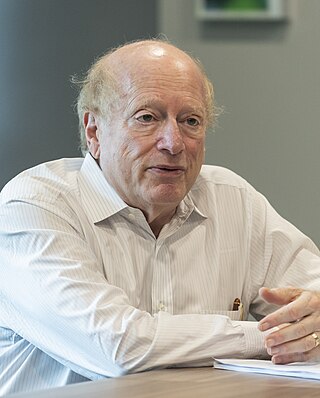
Mark Victor Tushnet is an American legal scholar. He specializes in constitutional law and theory, including comparative constitutional law, and is currently the William Nelson Cromwell Professor of Law at Harvard Law School. Tushnet is identified with the critical legal studies movement.
Michael C. Dorf is an American law professor and a scholar of U.S. constitutional law. He is the Robert S. Stevens Professor of Law at Cornell Law School. In addition to constitutional law, Professor Dorf has taught courses in civil procedure and federal courts. He has written or edited three books, including No Litmus Test: Law Versus Politics in the Twenty-First Century, and Constitutional Law Stories. He is also a columnist for Findlaw.com and a regular contributor to The American Prospect. Dorf is a former law clerk to Justice Anthony Kennedy of the U.S. Supreme Court and Judge Stephen Reinhardt of the United States Court of Appeals for the Ninth Circuit.
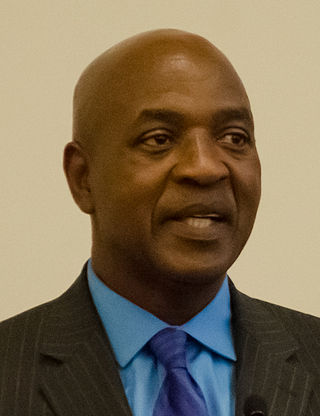
Charles James Ogletree Jr. was an American legal scholar who served as the Jesse Climenko Professor at Harvard Law School, where he was the founder of the school's Charles Hamilton Houston Institute for Race and Justice. He was also the author of books on legal topics.
Paul Finkelman is an American legal historian. He is the author or editor of more than 50 books on American legal and constitutional history, slavery, general American history and baseball. In addition, he has authored more than 200 scholarly articles on these and many other subjects. From 2017 - 2022, Finkelman served as the President and Chancellor of Gratz College, Melrose Park, Pennsylvania.

Zechariah Chafee Jr. was an American judicial philosopher and civil rights advocate, described as "possibly the most important First Amendment scholar of the first half of the twentieth century" by Richard Primus. Chafee's avid defense of freedom of speech led to Senator Joseph McCarthy calling him "dangerous" to America.
Bernard Bell is the Associate Dean for Academic Affairs and Faculty Professor of Law and Herbert Hannoch Scholar at Rutgers School of Law–Newark.
The movement for compulsory public education in the United States began in the early 1920s. It started with the Smith-Towner bill, a bill that would eventually establish the National Education Association and provide federal funds to public schools. Eventually it became the movement to mandate public schooling and dissolve parochial and other private schools. The movement focused on the public's fear of immigrants and the need to Americanize; it had anti-Catholic overtones and found support from groups like the Ku Klux Klan.
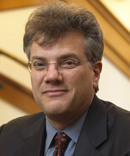
Richard H. Pildes is an American legal scholar who is the Sudler Family Professor of Constitutional Law at the New York University School of Law and a expert on constitutional law, the Supreme Court, the system of government in the United States, and legal issues concerning the structure of democracy, including election law. His scholarship focuses on public law and legal issues affecting democracy.

John Francis Manning is an American legal scholar who serves as the provost of Harvard University. He is the Dane Professor of Law at Harvard Law School (HLS), where he is a scholar of administrative and constitutional law. From 2017 to 2024, he was the 13th Dean of Harvard Law School.
Barry E. Friedman is an American academic and one of the country's leading authorities on constitutional law, policing, criminal procedure, and federal courts, working at the intersections of law, politics and history. Friedman teaches a variety of courses including Judicial Decisionmaking, Federal Courts and the Federal System, and Criminal Procedure: Fourth and Fifth Amendments, as well as a seminar on Democratic Policing. He writes about judicial review, constitutional law and theory, federal jurisdiction, judicial behavior, and policing. His scholarship appears regularly in the nation's top law and peer-edited reviews.

Rachel Elise Barkow is an American professor of law at the New York University School of Law. She is also faculty director of the Center on the Administration of Criminal Law. Her scholarship focuses on administrative and criminal law, and she is especially interested in applying the lessons and theory of administrative law to the administration of criminal justice. In 2007, Barkow won the Podell Distinguished Teaching Award at NYU. In the fall of 2008, she served as the Beneficial Visiting Professor of Law at Harvard Law School.
Matthew Caleb Stephenson is the Eli Goldston Professor of Law at Harvard Law School where he teaches he administrative law, legislation and regulation, anti-corruption law and the political economy of public law. His research interests include the application of positive political theory to public law.
Tomiko Brown-Nagin is an American legal scholar, historian, and academic. She is dean of Harvard Radcliffe Institute. She is also the Daniel P.S. Paul Professor of Constitutional Law at Harvard Law School and a Harvard University professor of history.
